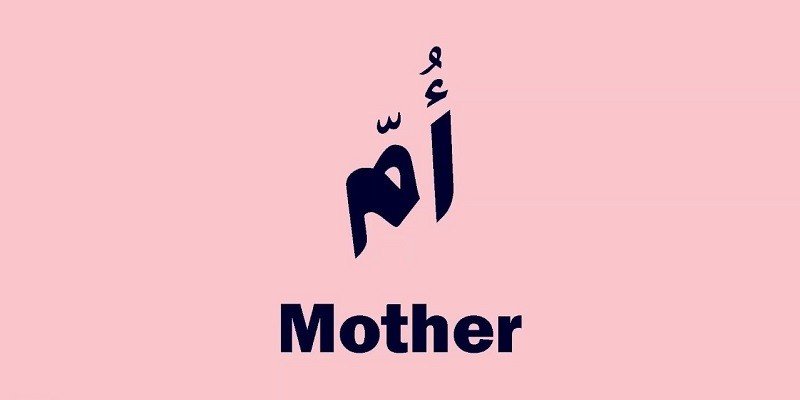How To Say Mother In Arabic?

In Arabic, the word for “mother” is “umm”. It is derived from the root word meaning “source” or “origin.” This reflects a deep respect for mothers as creators and nurturers in Islamic culture.
Umm can be used to address one’s own mother directly or simply to refer to any female parent in general. Another way of saying mother in Arabic is ‘walidah’, which literally translates to mean ‘birth giver’ or ‘original bearer’. Mothers are often referred to with love and affection when speaking about them, and terms such as ummi (my mother) may be used.
There are many other expressions related to mothers that can be found throughout Arab cultures, such as umm al-kulthum (kind mother), arhama rahimin (merciful womb), etc. All of these words demonstrate deep appreciation for mothers within the culture and language.
Mother and Father in Arabic
- First, learn the word for mother in Arabic which is “umm”
- Practice saying it out loud several times until you get a feel of how to properly pronounce it with the correct accent and cadence
- Once you are comfortable speaking umm, try using it conversationally by introducing yourself and including your mother’s name afterwards, for example: “Hello my name is [name], umm [mother’s name]”
- You can also add an honorific such as “ummuh” (literally meaning “my mother”) or “ummaha” (meaning “her mother”) after mentioning your own or someone else’s mother respectively when appropriate in order to show respect
How to Say Father in Arabic
Father in Arabic is said as “Ab”, which is the root word for father, husband, and ancestor. It can also be used to refer to a respected older man in the community. When speaking formally or respectfully about one’s own father, it would be more appropriate to say “Abu” followed by one’s father’s name.

Credit: www.amazon.com
How Do You Say Mama in Arabic?
The word for “Mama” in Arabic is “والدتي”. This term is widely used across the Arab world and conveys the same sentiment that English speakers express when they say “Mama”. In addition to being a term of endearment, it can also be used to refer to one’s mother or maternal figure more formally.
In Arabic culture, family ties are especially important and saying “والدتي” expresses love and respect towards one’s mother. It also serves as a reminder of home and security, no matter where in the world you may find yourself. While there are many words for parents found throughout different dialects of Arabic, “والدتي” remains a standard phrase used by native speakers regardless of their country or region.
What Do Arabic People Call Their Moms?
Arabic people call their moms “umm” (or “ummah”) which translates to “mother” in English. Umm is a term of endearment and respect that Arabic people use to refer to their mothers, as it emphasizes the important role she plays in the family and her unique relationship with her children. In Arab culture, mothers are seen as protectors and providers who give unconditional love and support.
The word “umm” expresses this deep connection between mother and child while also celebrating the special bond they share. It is common for all members of an Arab family to use “umm” when referring to each other’s mothers, regardless of whether or not they are related by blood. As such, saying “umm” has become synonymous with showing respect for one another within Arab communities around the world—a testament to just how much importance Arabs place on familial bonds.
What Does Umi Mean in Islam?
Umi means “mother” in Islam and is a term of respect for mothers. It reflects the high status and importance of motherhood within Islamic culture. Umi is used to refer to a mother’s loving care, her dedication to caring for her children, and her selfless devotion to providing them with whatever they need.
In many Muslim countries, it is customary to call any older woman ‘Umi’ as an expression of love and respect. The word umi also carries connotations of wisdom, strength, protection and comfort; these characteristics are often associated with mothers who act as guides along their children’s spiritual journey towards enlightenment. By using the term ‘Umi’, Muslims honor all that mothers have done for them over the years – from educating their children about religion to teaching them how to be independent individuals.
What Do Arabs Call Their Mom And Dad?
The answer to the question “What do Arabs call their mom and dad?” is that they typically refer to them as Ummi or Abbi, which are Arabic words for mother and father respectively. In some countries, children may also use more respectful terms such as Ummah for mother or Aboo for father. These titles demonstrate the deep respect Arab culture has for parents and underscore the importance of family in this region of the world.
The traditional roles of mothers and fathers remain strong within families—for example, a mother would be responsible for nurturing her children while a father works outside the home—and these terms reflect those cultural values.
Conclusion
Overall, it is important to know how to say mother in Arabic if you are traveling to an Arabic speaking country or have friends and family from Arabic-speaking countries. It can be a sign of respect and appreciation for the culture if you learn how to say terms like this correctly. Additionally, learning about different languages gives us insight into different cultures around the world.
Knowing how to say mother in Arabic is just one way that we can gain knowledge about other cultures.
